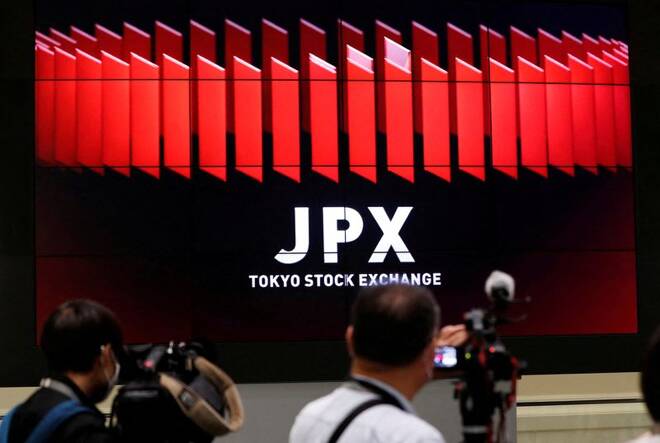Advertisement
Advertisement
Wall Street shakes off Fed, Ukraine anxiety as oil dips
By:
By Wayne Cole SYDNEY (Reuters) - Asian share markets slipped on Monday with the Federal Reserve expected to confirm it will soon start draining the massive liquidity that has fuelled the huge gains in growth stocks in recent years.
By Pete Schroeder
WASHINGTON (Reuters) – A tumultuous day on Wall Street saw stocks end higher after posting heavy losses earlier in the day, as uncertainty over rising geopolitical tensions and Fed policy weighed down oil and boosted safe havens.
All three major U.S. stock indices closed the day in positive territory, after the Dow Jones Industrial Average had posted an over 1,000-point decline earlier in the day.
The Dow ended up 0.29%, while the S&P 500 gained 0.28% and the Nasdaq Composite added 0.63%.
The MSCI world equity index, which tracks shares in 45 nations, was down 0.78%.
The late gains marked a surprising turnaround for U.S. stocks, which were battered last week, posting their heaviest losses since 2020. The decline potentially enticed bargain hunters to help push them higher Monday.
“Recent bearishness in equities is overdone, and out of line with activity momentum, easing bottlenecks, and what we expect to be a strong earnings season,” wrote JPMorgan analysts in a midday note.
The market tumult came as NATO said on Monday it was putting forces on standby and reinforcing eastern Europe with more ships and fighter jets in response to Russia’s military build-up at Ukraine’s borders.
The U.S. State Department on Sunday ordered diplomats’ family members to leave Ukraine, while President Joe Biden weighed options for boosting U.S. military assets in the region.
Attention is also turning to the U.S. Federal Reserve, which kicks off a two-day policy meeting on Tuesday. Investors are watching the central bank as closely as ever, as Fed officials look to unwind unprecedented stimulus and begin a path toward future rate hikes.
“Investors are accepting the harsh reality that the end of the ultra-easy monetary policy is upon us. This week the Federal Reserve meets and while we expect no changes at this meeting, the market is pricing in a full quarter point increase in March,” said Megan Horneman, director of portfolio strategy at Verdence Capital Advisors.
The risk-off attitude was evident in oil markets, as prices dipped by as much as 3% after closing Friday with a fifth straight week of gains.
Brent crude fell $1.62, or 1.8%, to $86.27 a barrel, while U.S. West Texas Intermediate (WTI) crude settled down $1.83, or 2.2%, to $83.31. [O/R]
Other riskier assets felt pressure as well. Bitcoin hit a six-month low Wednesday, but was up slightly late Monday to $36,921, still well below the November all-time high of $69,000.
Fed tightening looms
Concerns that the Fed could tighten too quickly at its meeting this week added to investor nerves.
The U.S. central bank is expected to confirm that it will soon start draining the massive pool of liquidity that has supercharged growth stocks in recent years.
Treasury yields were down on most maturities Monday. The benchmark U.S. 10-year yield was flat on the day at 1.7511%, after earlier hitting an 11-day low of 1.7070%.
Fears over the Fed and Ukraine boosted safe haven investments. The dollar hit a two-week high against a basket of currencies, last up 0.26%. Spot gold prices also jumped 0.55% to $1,843.26 an ounce..
(Reporting by Pete Schroeder in Washington; Editing by Cynthia Osterman and Rosalba O’Brien)
About the Author
Reuterscontributor
Reuters, the news and media division of Thomson Reuters, is the world’s largest international multimedia news provider reaching more than one billion people every day. Reuters provides trusted business, financial, national, and international news to professionals via Thomson Reuters desktops, the world's media organizations, and directly to consumers at Reuters.com and via Reuters TV. Learn more about Thomson Reuters products:
Latest news and analysis
Advertisement
